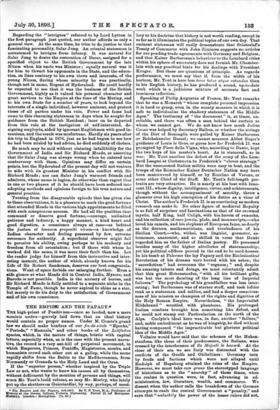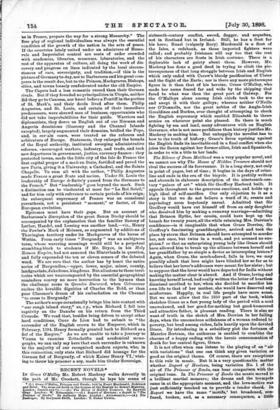THE EMPIRE AND THE PAPACY.*
THE high-priest of Positivism—once so lauded, now a mere nominis umbra—gravely laid down that an ideal history would contain no proper names. Under M. Comte's grand law we should make bonfires of our fin-de-siecle "Epochs," 4‘ Periods," "Manuals," and other books of the Leitfaden species, which, in the nature of things, bristle with capital letters, especially when, as is the case with the present narra- tive, the record is a very ant-hill of perpetual movement, in which Emperors, Princes, Pontiffs, Magistrates, monks, and humanists crowd each other out at a gallop, while the scene rapidly shifts from the Baltic to the Mediterranean, from Normandy or Granada to the Holy Land and the Oxus.
If the "superior person," whether inspired by the Triple Law or not, who wants to know his causes all by themselves, -without defilement by the mention of persons and things, will scorn Mr. Tout's lucid volume, so may Mr. Morley, who lately put up the shutters on Guicciardini, by way, perhaps, of coral- • The Empire and the Papa" 918-1273. By T. F. Tout. M.A.. Professor of History at the Owens College, Vitoria University. Period 1.1. (of European iiistory). London Eivingtons. [7s. 85.1
lary to his doctrine that history is not worth reading, except in so far as it illuminates the political topics of our own day. That eminent statesman will easily demonstrate that Sviatoslaf'a Treaty of Commerce with John Zimisces suggests no articles for our pending trade agreements with Germany and Belgium, and that Kaiser Barbarossa's behaviour to the Lombard cities within his sphere of suzerainty does not furnish Mr. Chamber. lain with any practical hints for his dealings with President Kruger. But these are questions of principle. As regards performance, we must say that if, from the width of his horizon, Mr. Tout is here less teres totus atque rotundas than in his English history, he has produced a sound, up-to-date work which is a judicious mixture of accurate fact and luminous reflection.
Speaking of Philip Augustus of France, Mr. Tout remarks that he was a Monarch " whose complete personal impression it is bard to grasp, even in the scanty measure in which it is safe to individualise the shadowy statesmen of the Middle Ages." The testimony of "the document" is, at times, un- reliable, and there was often a man behind the curtain at whom we cannot get. We do not know how much Julius Cesar was helped by Secretary Balbus, or whether the strings of the Diet of Roncaglia were pulled by Kaiser Barbarossa or Reichskanzler Dassel; we cannot measure Abbot Sager's guidance of Louis le Gros, or guess how far Frederick II. was prompted by Piero della Vigna, who, according to Dante, kept the two keys of his master's heart. As in statecraft, so in war. Mr. Tout ascribes the defeat of the army of the Lom- bard League at Cortenuova to Frederick's "clever strategy." Bat the unseasoned Italian militia were easy to beat, and the troops of the Romischer Kaiser Deutscher Nation may have been manoeuvred by himself, or by Eccelino of Verona, or some other Chief of the Staff. Mr. Tout's full-length por- traits are very attractive. He is nearly at his best with Inno- cent III., whose dignity, intelligence, virtue, and achievements, though without the accompaniment of sanctity, throw a glamour over his high conception of his duties as a vicar of Christ. The author's Frederick II. is as convincing as modern research can make it. No other figure of medieval Royalty is so full of surprises and fascinations as that of the crowned mystic, half King, half Caliph, with his harem of eunuchs, and his collection of rare jewels, plate, and manuscripts,—who loved his camels, and his elephant of European fame, as dearly as the doctors, mathematicians, and troubadours of his Sicilian Court,—who, withal, was linguist, geometer, as- tronomer, anatomist, and eo skilled in verse that Dante regarded him as the father of Italian poetry. He possessed besides many of the higher attributes of statesmanship; yet his political edifices proved in the end to be card-houses. In his tomb at Palermo the lay Papacy and the Ecclesiastical Revolution of his dreams were buried with his ashes; the " sacerdotium" had overcome the " regnum; " and, despite his amazing talents and doings, we mast reluctantly admit that this great Hohenstaufen, "with all his brilliant gifts, was but the most dazzling of the long line of Imperial failures." The psychology of his grandfather was less inter- esting; but Barbarossa was of sterner stuff, and took loftier rank as a statesman and soldier, and had a deeper conscious- ness of his mission as champion of the rights and dignities of the Holy Roman Empire. Nevertheless, " the Imperialist Hildebrand " wrestled with phantoms. His prolonged Italian combats brought him something like defeat, and he could not stamp out Particularism on the north of the Alps. Carlyle's ideal hero was, in fine, another "failure," and, noble embodiment as he wae of kingship, he died without having compassed " the impracticable but glorious political idea of the Middle Ages."
Voltaire would have said that the schemes of the Hohen- stauf ens, like those of their predecessors, the Salians, were crossed by the interference of Sa Majestg le hasard. At the close of their era we see Italy was distracted with the conflicts of the Guelfs and Ghibellines : Germany torn by feuds and factions which were not allayed until Rudolph of Hapsburg attained the reins of the Empire. However, we must take cum gran the stereotyped language of historians as to the " anarchy " of these times, when the realms in question were, in fact, advancing in ad- ministration, law, literature, wealth, and commerce. We dissent when the author calls the breakdown of the German attempts to exalt the central Government a "penalty," and says that "unluckily the power of the lesser rulers did not,
as in France, prepare the way for a strong Monarchy." The free play of regional individualism was always the essential condition of the growth of the nation in the arts of peace.
If the countries lately united under an admixture of Home- rule and Imperialist control are seats of order crowded with academies, libraries, museums, laboratories, and the rest of the apparatus of culture, all doing the work of dis- covery and progress on lines indicated by the local circum- stances of race, sovereignty, and tradition,—if this is the picture of Germany to-day, not to Barbarossa and his great com- peers is the result due, but to the Princes, Markgraves, Bishops, cities, and towns loosely confederated under the old Empire.
The Capets had a less romantic record than their German rivals. But if they founded no principalities in Utopia, neither did they go to Canossa, nor kneel before a Pontiff in the portico of St. Mark's, and their deeds lived after them. Philip Augustus, and St. Louis, and certain of their immediate predecessors, were shrewd men of business, opportunists who did not take improbabilities for their guide. Warriors and diplomatists, they drove us English out of our Norman and Angevin dominions (Gascony and the Channel Islands excepted), largely augmented their domains, bridled the Pope, and, in certain cases, were treated as the referees and arbitrators of Europe. Statesmen, they enlarged the bounds of the Royal authority, instituted sweeping administrative reforms, encouraged markets, industry, and trade, and took new departures in government, justice, currency finance : they protected towns, made the little city of the Isle de France the first capital proper of a modern State, fortified and paved the new Paris, giving it a University, a Cathedral, and the Sainte Chapelle. To sum all with the author, " Philip Augustus made France a great State and nation. Under St. Louis the leadership of Europe definitely passed from the Germans to the French." But "leadership" goes beyond the mark. Such a distinction can be vindicated at most for " Le Roi Soleil," and for him only with reference to certain periods of his reign; the subsequent supremacy of France was an occasional parenthesis, not a persistent " moment," or factor, of the European evolution.
Epitomes must have their gaps. But an account of Barbarossa's disruption of the great Saxon Duchy should be accompanied by the explanation that the familiar Saxony of Luther, Handel, and Leasing was another land,—viz., Henry the Fowler's Mark of Meissen, as augmented by additions of Thuringian territory under its Markgraves of the house of Wettin. From early times " Burgundy " was an ambiguous term, whose wavering meanings would still be a perpetual stumbling-block to students if Mr. Bryce, in his Holy Roman Empire, had not annexed the Hinterlands in question, and fully expounded the ten or eleven senses of the debated word. We are sure that the author has by heart the entire series of Burgundies,—upper, lower, major, minor, county, landgraviate, dukedoms, kingdoms. But allusions to those terri- tories which are unaccompanied by the essential geographical reminders convey no more instruction to the layman than the challenge scene in Quentin _Durward, when Crevecceur recites the heraldic dignities of Charles the Bold, or than poor Clarence's dream of his embarkation on the Channel "to cross to Burgundy."
The author's scope occasionally brings him into contact with "our rough island story," as, e g., when Richard I. fell into captivity on the Danube on his return from the Third Crusade. We read that, besides being driven to accept other hard conditions, Coeur de Lion had to submit to "the surrender of the English crown to the Emperor, which in February, 1194, Henry formally granted back to Richard as a fief of the Empire." As we are unable to take a journey to Vienna to examine Zeitschrifts and academical mono- graphs, we can only say here that such surrender is unknown to the majority of our recognised modern experts, who, in this connection, only state that Richard did homage for the German fief of Burgundy, of which Kaiser Henry VI.,`wish- ing to throw his prisoner a sop, made him titular Sovereign.



































 Previous page
Previous page